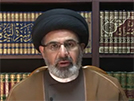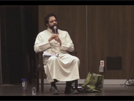1
Chapter 5-Islam - A Comprehensive School
- Details
- Hits: 4150
Chapter 5
Islam - A Comprehensive School
--------------------------------------------------------------------------------
Islam, which is based on a perfect conception of the universe is a comprehensive and realistic school. In Islam attention has been paid to all aspects of human needs, whether they are carnal or spiritual, intellectual or sentimental, individualistic or social and whether they pertain to this world or the next.
The series of the Islamic teachings comprises three sections:
(i) Doctrinal tenets or fundamental principles in which every one is required to obtain belief. The task which one has to undertake in this respect is a sort of scientific and research work.
(ii) Moral law or the qualities which a Muslim must inculcate in himself. A Muslim should also shun the qualities which are opposed to them. The task which one has to undertake in this respect is a sort of character building.
Chapter 5
Islam - A Comprehensive School
--------------------------------------------------------------------------------
Islam, which is based on a perfect conception of the universe is a comprehensive and realistic school. In Islam attention has been paid to all aspects of human needs, whether they are carnal or spiritual, intellectual or sentimental, individualistic or social and whether they pertain to this world or the next.
The series of the Islamic teachings comprises three sections:
(i) Doctrinal tenets or fundamental principles in which every one is required to obtain belief. The task which one has to undertake in this respect is a sort of scientific and research work.
(ii) Moral law or the qualities which a Muslim must inculcate in himself. A Muslim should also shun the qualities which are opposed to them. The task which one has to undertake in this respect is a sort of character building.
(iii) Law or the rules of conduct in respect of human activities, whether they pertain to this world or the next and whether they are individualistic or collective.
According to the Shi'ah school there are five doctrinal tenets of Islam: Monotheism, Justice, Prophethood, Imamate and the Hereafter.
As far as the doctrinal tenets are concerned, Islam maintains that it is not enough just to acknowledge them unquestioningly or as a family tradition. It is the duty of every individual to believe in them independently and voluntarily after having been convinced of their truth. From Islamic point of view worship is not confined to the physical worship like Prayers and Fasting or to financial worship like the payment of Khums and Zakat. There is another kind of worship which consists of thinking and pondering. If this mental worship leads to the awakening of man, it is far superior to many years' physical worship.
Causes of Wrong Thinking
The Holy Qur'an calls upon the people to think and to draw conclusions. It regards thinking as a part of worship, and does not recognize the belief in its doctrinal tenets if it is not the outcome of correct thinking. Islam in this connection has paid attention to a basic point. It has pointed out the causes which lead to wrong thinking and has explained what to do to avoid error and deviation.
The Holy Qur'an has mentioned a number of factors which cause error. We mention them below:
I. Reliance on Conjecture Instead of Sure Knowledge
The Holy Qur'an says: "Most people are such that if you follow them they will lead you away from the right path, because they rely on conjecture only." (Surah al-An'am, 6:116)
The Holy Qur'an strictly forbids following a conjecture. It says: "Do not follow that of which you have no knowledge. Indeed the ear, the eye, and the heart each will be questioned." (Surah Bani Isra'il, 17:36)
The philosophers admit that dubious knowledge is the main cause of mistakes. Many centuries after the revelation of the Holy Qur'an, Descartes declared this to be the first principle of his logic. He said: "I do not consider anything to be a reality unless it becomes obvious to me. I avoid haste, association of ideas and predisposition; and accept only that which is so clear and distinct that there can be no doubt about it"
II. Bias and Base Desires
If man wants to judge rightly, he should fully maintain his impartiality. In other words he should seek truth only, and accept without hesitation what evidence proves. He should behave exactly like a judge in a court of justice, who while studying a case ought to be neutral to the claims of both the parties. If he is biased towards one party, the arguments in favour of that party will unconsciously attract his attention and the arguments against it will automatically be missed by him. That is what will mislead the judge.
If man is not neutral and his thinking is lop-sided, the pointer of his thinking will unconsciously be inclined towards his personal liking and personal desire. That is why the Holy Qur'an regards the base desires as much a source of error as reliance on a guess and conjecture. It says: "They follow but conjecture and that which themselves desire." (Surah an-Najm, 53:23)
III. Haste
To be able to express an opinion about a question one should have adequate evidence before him. Unless there is enough evidence, any hasty expression of an opinion is likely to lead to an error. The Holy Qur'an repeatedly refers to the insufficiency of human knowledge for pronouncing an opinion in respect of many important questions. For example it says: "You have been given but little knowledge." (Surah Bani Isra'il, 17:85)
Imam Sadiq has said: "In the two verses of the Holy Qur'an Allah has warned men against two things:
(i) He has said that they must not believe a thing unless they have sure knowledge about it (Warning against hasty believing).
(ii) He has said that they must not deny a thing unless they have sure knowledge about it (Warning against hasty denial).
In one verse Allah says: "Were they not asked in the Book to give an undertaking that they would speak nothing concerning Allah except the truth?" (Surah al-A'raf, 7:169)
In another verse He says: "In fact they denied that of which they had not enough knowledge." (Surah Yunus, 10:39)
IV. Traditional Thinking and Looking to the Past
Man has a natural tendency to readily accept an idea or a belief that was accepted by the past generations, without giving it any further thought. The Holy Qur'an reminds people that they should have independent thinking and should not accept anything without judging it carefully, simply because it was accepted by others in the past. The Holy Qur'an says:
"We follow the traditions of our forefathers. What! Even though their forefathers did not understand anything and had no guidance." (Surah al-Baqarah, 2:170)
V- Cult of Personality
Another cause of wrong thinking is the cult of personality. Because of the great respect in which they are held, the celebrated historical and contemporary personalities influence the thinking and the will of others. In fact the famous personalities control the thinking of others, who think as they think and have the same opinions as they have. Other people do not dare differ from the great people and so lose their independence of thought and will.
The Holy Qur'an calls upon people to think independently and not to follow their elders and other influential personalities blindly, because to do that is likely to bring them bad luck.
The Holy Qur'an tells us that the misguided people will be saying on the Day of Judgement: "Our Lord! We obeyed our chiefs and great men who misled us from the right path." (Surah al-Ahzab, 33:67)











